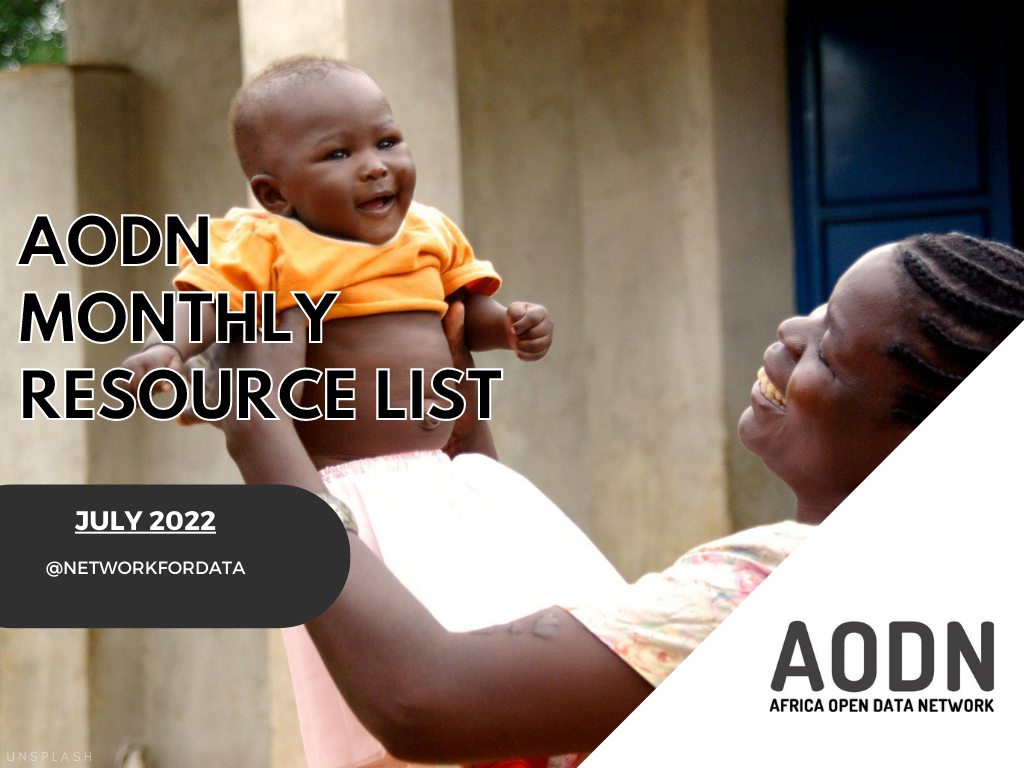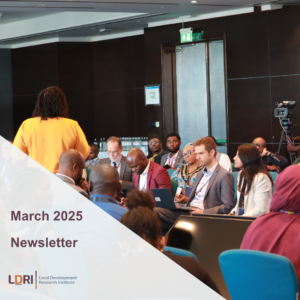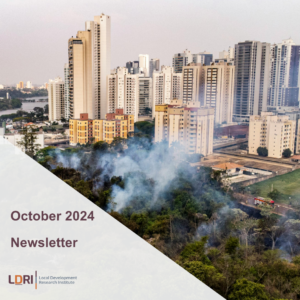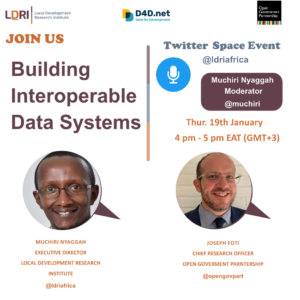![]()
July 2022 Resource List

Monthly Resource List
The monthly resource list for July 2022 puts together content including a reading list, avenues for capacity building, and events from different stakeholders across the globe on the use of open data for better service delivery in sectors such as Governance, Gender, Agriculture, Education, and Health.
-
What we are reading
Reimagining Data and Power: A Roadmap for Putting Values at the Heart of Data
Data shapes our daily lives and permeates the economic and social landscape of every country in the world. Access to new data sources and shifts in technology have generated critical insights into the progress and pitfalls of tracking the United Nations (UN) Sustainable Development Goals (SDGs). Meanwhile, widespread data collection and use have transformed how people advocate for change and how decision makers understand and address community needs. Yet barriers and entrenched inequalities continue to hinder data’s potential to improve lives. Far too many people remain excluded from or invisible in data while others are harmed by their inclusion in it. Read More
Resilient Communities Need Gender Data
To support the resilience of women, girls, and gender-diverse groups—as well as their households and communities—during (and beyond) crises, gender data is a key solution. Governments must collect and use gender data to identify and effectively respond to women’s, girls, and gender-diverse communities’ needs and to document their contributions to crisis mitigation and recovery. Read more
Reliable Data, The Pathway To Fighting Food Insecurity
There seems to be a missing link, especially in Africa in using data in the fight against food insecurity. Leaders and stakeholders have always assured their citizens of using data to formulate policies in the fight against food insecurity. However, evidence has shown that in most countries the fight has not been successful. Resources that must be in place in ensuring proper data collection and management to inform policies seem not to be available. The questions one would want answers to are; is data the problem in having the right policies in place? What was wrong with the data collected and used to inform policy over the years? How were these data collected and analyzed? Were policymakers able to interpret the data correctly? Read more
Building Back Is Not Enough: To Achieve the SDGs and Recover from Crisis, It’s Time to Elevate Gender Data as a Policy Priority
In the face of multiple, coalescing global crises, the 2022 UN High-level Political Forum convened last week to take stock of progress toward the 2030 Agenda for Sustainable Development. This year’s Forum assembled under the theme of “building back better”—even as the COVID-19 pandemic enters a third year; climate change drives record-breaking heat and wildfires across much of Western Europe; and the global toll of conflict in Ukraine continues to mount, all exacerbating gendered inequalities. But although years of progress toward the Sustainable Development Goals (SDGs) and gender equality are at stake, Member States have a window of opportunity to drive inclusive development and ultimately respond to the needs of the most vulnerable by financing, collecting, and using gender data. As a lever of smart policymaking for women, girls, and gender-diverse communities, gender data is a critical pillar of global resilience. Read more
The Future of Democratic Data Governance: Insights from Latin America
In the last decade, we have seen a shift from openness (and open data) to a more complex data agenda for several reasons. Take, for instance, the national and international scandals that have occurred around the misuse of personal data by companies and governments that, in the view of many, could jeopardize the very foundation of democracy and human rights. In this context, it is worth asking how democratic countries can address data governance so that data use lives up to democratic ideals. Or to put it another way: What does democracy look like in the data realm? To answer this question, D4D and ILDA decided to explore three cases in Latin America where people are asking this question. In this blog, we summarise the discussions held by several Latin American experts about the work of Fundación Karisma and Datasketch in Colombia, SocialTic in México, and Datysoc in Uruguay. Read More
Women At The Nexus Of Agriculture, Nutrition, and Energy
Food production is the most intuitive linkage between agriculture and nutrition, but the relationship goes far beyond. Women play a fundamental role in the households by providing the bulk of agricultural labor and as primary caregivers; make the decision on the choice of energy to use for household meal preparation. Earlier in 2022, the LDRI team held discussions with stakeholders in Kiambu County to identify development challenges faced by women at the intersection of Agriculture, Nutrition, and Energy. These discussions included conversations with key actors at the County level from the departments of Public Health and Malnutrition, Renewable Energy and Climate Change, and the department of Crops and Irrigation. Through these, a clearer picture of how departments produced, managed, and shared data began to emerge. Read More
-
Events
Topic What You Need to Know About Your Digital Trail: Privacy in the Era of Datafication 5th Aug
Africa Digital Skills Conference 8th-10th Nov
-
Training/Tools
Eliminating Violence Against Women and Girls (VAWG) Data Coordination Training




